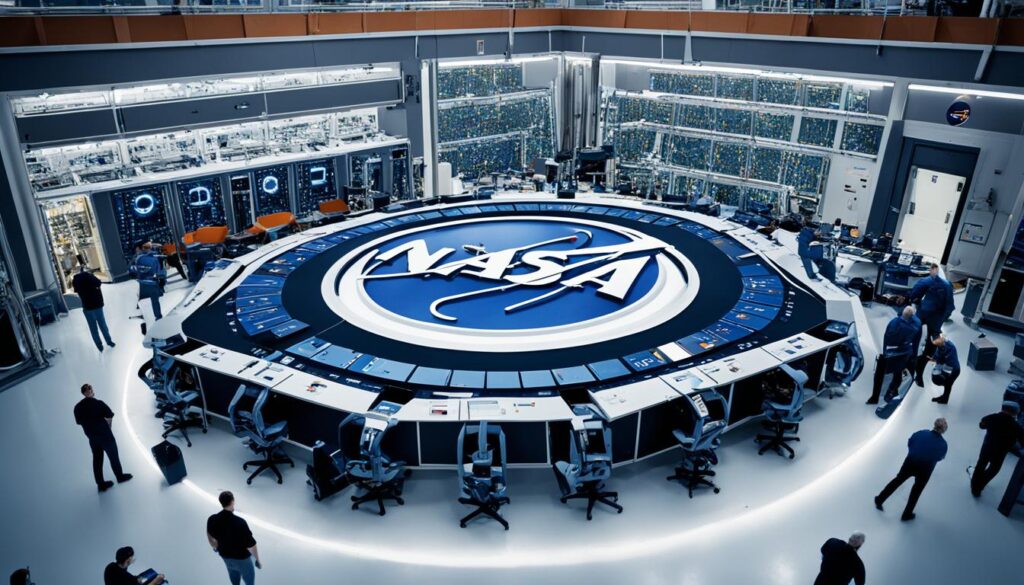In a universe where technology leaps faster than a speeding photon, the abrupt termination of NASA’s quantum computing program has left tech aficionados and conspiracy theorists alike scratching their heads. Was it a warp-speed miscalculation or a calculative measure taken by the stars of science? As whispers of Why did NASA shut down quantum computer and NASA quantum computing program termination traverse the intergalactic highways of the internet, we’re here to demystify the black hole of silence surrounding this stellar conundrum.
Key Takeaways
- Unravel the enigma behind NASA’s sudden closure of its avant-garde quantum computing project.
- Similarities of the NASA shutdown to the vanishing of a quasar—unexpected, perplexing, yet full of cosmic significance.
- The quantum computing cosmos is abuzz with theories, but facts are the ultimate grounding force.
- Uncover if the reason is nestled in the fabric of competitive technology or buried within the classified archives of NASA.
- The mystery behind the NASA quantum computer saga continues, piquing the curiosity of tech enthusiasts and scientists alike.
Dissecting Google’s Quantum Breakthrough
In a stride that nearly broke the internet, Google announced an achievement that sounded like it hopped straight out of a science fiction novel. The tech titan claimed that its quantum computer had reached the elusive goal of ‘quantum supremacy’. This breakthrough ostensibly showcased that their quantum wonder had surpassed the computing power of traditional computers for a specific, complex task. The proclamation whipped up a frenzy in tech circles, with people eager to understand the implications – a momentous leap forward in computing or a brass ring still out of reach?
Shortly after the leak of Google’s quantum supremacy paper, the previously quiet waters of quantum research rippled fiercely as IBM entered the fray. In a counterclaim that appeared like a duel of intellectual giants, IBM’s team of scientists challenged the very foundation of Google’s assertion.
IBM Challenges Google’s Quantum Supremacy Claim
Emerging from its arsenal of mighty brains and computational artillery, IBM’s counterclaim suggested that Google’s chest-thumping might have been premature. The IBM researchers penned an articulate rejoinder with a claim that they could simulate Google’s quantum feat, and within a matter of days. They argued that, by harnessing their Summit supercomputer, they could perform Google’s supposed 10,000-year pending task in just 2.5 days. That’s like comparing the time it takes to binge-watch a season of your favorite TV show versus witnessing the evolutionary span of a Galapagos tortoise!
The “Quantum Supremacy” Controversy Explained
While the clash of these tech titans on quantum capabilities continues to tantalize onlookers, it reveals a deeper debate on the term “quantum supremacy”. A term born from a physicist’s whiteboard, ‘quantum supremacy’ has grown to a buzzword that both excites and confuses. IBM’s incisive critique not only questions Google’s data but ponders upon the purpose and clarity of the supremacy itself. Does the term misconstrue scientific goals? Does it over-promise the scope of present-day quantum computing? These are the riveting queries that feed this insightful moment in tech history, as we navigate towards a better understanding of NASA’s quantum computer closure and the brawls of the quantum computing realm.
IBM’s forensic deconstruction of the term ‘quantum supremacy’ may lead to a lexicon shift, urging the scholars to chuck the ‘supremacy’ for a terminology that accurately encapsulates the quantum quandaries. For now, though, the tussle for quantum crown jewel status rolls on, with fervent watchers eager to see which computing Goliath’s formula will render the other’s obsolete, all against a backdrop of secretive movements and cosmic possibilities tied to NASA’s enigmatic shutdown of its quantum program.
Insight into NASA and Google’s Collaboration on Quantum Computing
The interface between NASA and Google in the realm of quantum computing took an unexpected turn when valuable details from a research paper seeped into cyberspace via NASA’s portal, only to dissolve again as abruptly as they appeared. The quantum computing NASA shutdown has intrigued the scientific community and raised a cocktail of questions regarding the NASA quantum computer closure explanation. What played out could be compared to the unscripted twists in an interplanetary theatre, leaving us as the audience at the edge of our seats.

In the silence that followed the quantum claim retraction, we’re left to consider if the quietness was indeed the quiet before the storm. Was Google straining at the leash, bound by an embargo that pins them down from erupting with a discovery that could redefine our technological landscape? Or was the retraction a backtrack, initially propelled by fervor that had to buckle under the weight of scrutiny?
However, with collaboration at the heart of this narrative, the focus shifts slyly back to NASA – their role, their reticence, and their reasons. Despite the absence of an official communique, the closure of NASA’s quantum computing program shifts orbits from a technical glitch to something more orchestrated, potentially peppered with strategic underpinnings that stretch far beyond our current understanding or the realm of technical hiccups.
The dance of disclosure and concealment has proved to be a masterclass in suspense, stirring the pot of theories while concrete information plays hide and seek. Google’s ‘mum’s the word’ posture fuels the warp-drive of rumor mills, making every anticipation as charged as the quantum particles in question.
Amid these constellations of speculations lies a black hole – one that either holds answers powerful enough to disrupt or realign the cosmos of computing or simply a void where questions continue to multiply unfettered by answers. The quantum computing NASA shutdown and the NASA quantum computer closure explanation remain as elusive as the dark side of the Moon, but make no mistake, the quest for truth is on, propelling us into uncharted territories of discovery and doubt.
How IBM Suggested Quantum Supremacy Was Overstated
In the cosmic tug-of-war for quantum computing prowess, IBM’s stance on Google’s declaration of quantum supremacy came as a persuasive counter-narrative. The intricate chess game between these computing behemoths further intensified with IBM’s critique of quantum supremacy, prompting a closer look at the reasons for NASA’s quantum computer shutdown. In this scenario, IBM played the role of a meticulous mathematician, weaving a tapestry of algorithms and computations to suggest that the world may not yet be at the whims of a quantum superpower.
Let’s peel back the layers of IBM’s critique and uncover how they proposed tackling such a complex quantum conundrum.
IBM’s Alternative Method Using Summit Supercomputer
The Summit supercomputer, a colossal brainchild of IBM’s technological innovation, stood at the crux of IBM’s alternative approach. It hinted at a scenario where a seemingly impossible computational task could be reimagined. IBM’s assertion was as bold as it was technical; they professed that with Summit’s massive processing might, the heralded 10,000-year quantum feat could be condensed into a mere 2.5 days. This claim perhaps gave solace to those bewildered at NASA’s quantum computer silence and piqued curiosity among the tech-savvy, sparking discussions on the practical capabilities of current quantum machines.
Advanced Mathematics and Computing Techniques
IBM’s riposte was not just a testament to their supercomputer’s brute force but also a demonstration of their intellectual arsenal. By dissecting the quantum problem into smaller ‘subcircuits’, they revealed a path that could make quantum problems more palatable for classical systems. Such use of advanced mathematics, particularly tensor networks, not only challenged the quantum supremacy claim but also unfurled a new perspective on simulating quantum tasks.
IBM’s approach brought to light the complexities of quantum computation and suggested that while quantum machines possess great potential, the race towards true supremacy is far from over. It seemed to resonate with the elusive reasons for NASA’s quantum computer shutdown, painting a picture of the quantum landscape that is still being charted.

At this juncture, both NASA and Google remain tight-lipped. The scientific and tech communities, filled with eager anticipation, continue to seek clarity on the quantum computing narrative. The intrigue surrounding NASA’s sudden departure from the quantum arena leaves more questions than answers – strategically or technically driven? Meanwhile, IBM’s critique may have adjusted the trajectory of quantum supremacy, ensuring the debate remains lively and grounded in methodical science rather than soaring unchecked into theoretical hyperdrive.
Why Did NASA Shut Down Quantum Computer
Amidst a cosmic whirlwind of technological advancements, the abrupt grounding of NASA’s quantum computing efforts sparked a universe of questions. The impact of NASA closing quantum computer operations sent ripples through the space-time continuum of the scientific community, leaving many pondering the significance of NASA quantum computer shutdown. It’s like discovering a wormhole and then, poof, it’s gone—leaving every space cadet and Earthling alike to wonder, “What just happened?”
While most information remains as elusive as Earth 2.0, some speculate that NASA’s calculated ceasefire in the quantum realm might boil down to a high-stakes intergalactic chess match with kings, knights, and pawns positioned with thoughtful trepidation. Competitive pressures may have ignited a light-speed retreat, or perhaps reputational risks whispered caution into the ears of NASA’s elite. Was it a strategic entanglement or a quantum leap too far?
Others muse that this curtain-closed act is a simple case of “Houston, we have a problem” in the intellectual property department. Could the great minds behind the curtain be locking down their cosmic secrets before premature leaks turn into black holes, swallowing the potential for controlled scientific applause?

Let’s call on the witness stand the data that orbits the event horizon of this computational conundrum:
| Quantum Computing Milestone | IBM’s Critique | Public Response |
|---|---|---|
| Google’s claim of quantum supremacy | Simulation possible with Summit supercomputer in 2.5 days | Questioning true advancement |
| IBM’s proposed quantum simulation | Advanced tensor networks technique | Interest in realistic timelines for practical quantum applications |
| NASA and Google’s fleeting paper | Term “quantum supremacy” causing confusion and misinterpretation | Increased scrutiny over quantum computing claims |
As NASA reorients its star chart and retreats behind a veil of policy and procedure, we must navigate this nebula of unknowns with our senses set to maximum scan. Is this mere recalibration or do we smell the charred remnants of a bridge too quickly incinerated in the quantum race?
From the look of it, the impact of NASA closing quantum computer stretches far beyond insignificant ‘Houston’ problems, potentially altering the course of interstellar computation. The significance of NASA quantum computer shutdown may well reside in the silent halls of strategy and safeguarding—a covert operation in the cosmos where the whisper of every move is a potential butterfly effect cascading through centuries of data encryption and tech warfare. Out trots Schrödinger’s cat, leaving us to wonder: Is it alive with knowledge, or dead to the world?
The Potential of Quantum Computing in Revolutionizing Technology
Quantum computing, once a figment in the futurist’s eye, is now blazing trails into uncharted tech territory. Its brush could paint a new dawn across countless sectors, potentially archiving today’s computing paradigms to the annals of history. Yet, the enigma intensifies with the implications of NASA shutting down its quantum computer, beckoning a global NASA quantum computer shutdown investigation. This move could be the smoke signal for the need for caution while rushing towards a quantum future. As dazzling as quantum prospects appear, they tread on grounds as unstable as quicksilver, necessitating a delicate dance between innovation and practicality.
From Drug Discovery to Artificial Intelligence
In the phantasmagoria of possibilities, quantum computing promises to reboot entire industries. Imagine a pharmaceutical zenith where drug discovery accelerates from a crawl to a sprint, smashing through complex biological simulations in moments. Or, consider artificial intelligence, armed with quantum processing, transcending limitations and evolving at an unprecedented pace. The reality is at once invigorating and daunting because if quantum computing can unravel secrets of the microscopic world, what summit won’t be in reach?
The Future of Cryptography and Quantum Secrecy
The plot thickens in the cryptic realm of cybersecurity, where quantum computing heralds a double-edged sword. Today’s cryptographic citadels may crumble under the quantum sledgehammer, compelling a reinvention of secrecy protecting cyberspace. Yet, in this apparent chaos, quantum secrecy emerges as the guardian of the gate, potentially devising ciphers impenetrable by classical breaches. While quantum computing flirts with the cloak and dagger of cryptography, it winks at the prospect of safeguarding our digital lives like never before.
The canvas, however, remains vast and seemingly infinite—the tools to exploit quantum mechanics are still gestating. As scientists labor to transition from theory to practice, the affair between potential and praxis jolts at every juncture. One thing is certain: The aftermath of NASA’s quantum computing blackout could either be the prelude to groundbreaking advancements or a reality check curtailing premature exuberance. The coming years will tell if quantum supremacy is the game-changer it’s poised to be, or if it will simmer in quantum ambiguity as we cautiously decrypt its true essence.
